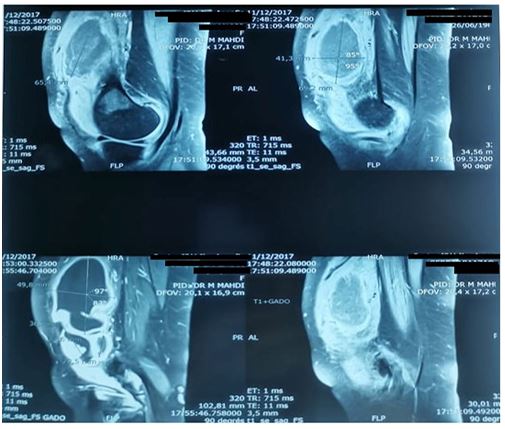Clinical Image - Volume 3 - Issue 3
Ipoma arborescens: an uncommon diagnosis for swelling knee
Yosra Bouattour1; Ichrak Mnif1; Faten Frikha1; Zeineb Mnif2; Zouhir Bahloul1
1Internal Medicine Department, Hedi Chaker Hospital, Sfax Tunisia.
2Radiology Department, Hedi Chaker Hospital, Sfax Tunisia.
Received Date : May 07, 2023
Accepted Date : June 14, 2023
Published Date: June 21, 2023
Copyright:© Yosra Bouattour 2023
*Corresponding Author : Yosra Bouattour, Internal Medicine Department, Hedi Chaker Hospital, Sfax Tunisia.
Email: yosra01.bouattour@gmail.com
DOI: Doi.org/10.55920/2771-019X/1465
Abstract
Lipoma Arborescens is an extremely rare and benign condition affecting joints synovial tissue. It should be suspected in patients with very slow mono-articular swelling.
Description
A 30-year-old woman with no prior medical history reported left knee pain and swelling evolving for 4 years. The swelling had progressively worsened over the past 4 months, becoming resistant to analgesics and nonsteroidal anti-inflammatory drugs. Physical examination showed only a positive patellar shock on the left without local inflammatory signs. Biological data were within normal range particularly, phosphocalcic and uricemia tests. The conventional knee radiograph was normal. Joint fluid was sterile on puncture, with a predominance of neutrophil cells. There were no crystals. Magnetic resonance imaging (MRI) was performed, showing multiple hypointense T1 formations that are FAT/SAT enhanced in the quadricipital bursa. These formations take up contrast after gadolinium injection, with a heterogeneous bone framework, as well as a large intra-articular effusion. A biopsy was indicated and microscopic examination confirmed that it was a lipoma arborescens of the knee with foci of abscessation.
The patient was treated by a subtotal removal of the intra-articular tumor. Two years later, she reconsulted for relapse of pain and swelling of the left knee related to a gonarthrosis.
Discussion
arborescens is an uncommon benign type of lesion that may occur in the synovium lining of joints or bursae. It is characterized by villous, non-destructive lipomatous proliferation of synovial tissue and mainly affects the suprapatellar pouch of the knee [1]. It occurs at any age with no gender predominance. X-ray shows non-specific findings. MRI with fat saturation sequences features includes joint effusion, arborescent or frond-like synovial masses. Only histological investigations provide a definitive diagnosis and classification of this nonmalignant soft tissue tumor. Surgical excision should be considered in case of manifest pain or movement restriction. Relapses following synovectomy have not been reported [2]. On the other hand, few authors incriminated lipoma arborescens in the early development of arthrosis.

Figure 1: Magnetic resonance imaging (MRI) was performed, showing multiple hypointense T1 formations that are FAT/SAT enhanced in the quadricipital bursa.
References
- Huang Y, Liu H, Wang Y, Chu X, Liu H, Wang H. Imaging features of lipoma arborescens. Acta Radiol. 2022; 63(8): 1043-1050.
- Theermann R, Ohlmeier M, Hartwig CH, Wolff M, Krenn V, Liewen C, Citak M, Gehrke T. Lipoma arborescens - Uncommon Diagnosis for Joint Swelling: Case Report and Review of the Literature. Z Orthop Unfall. 2020; 158(6): 618-624.

